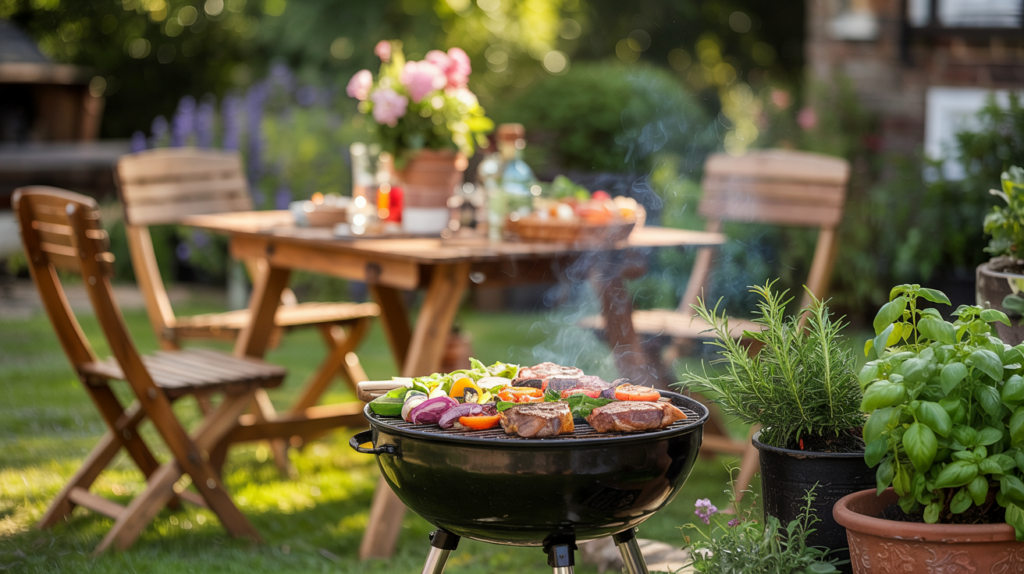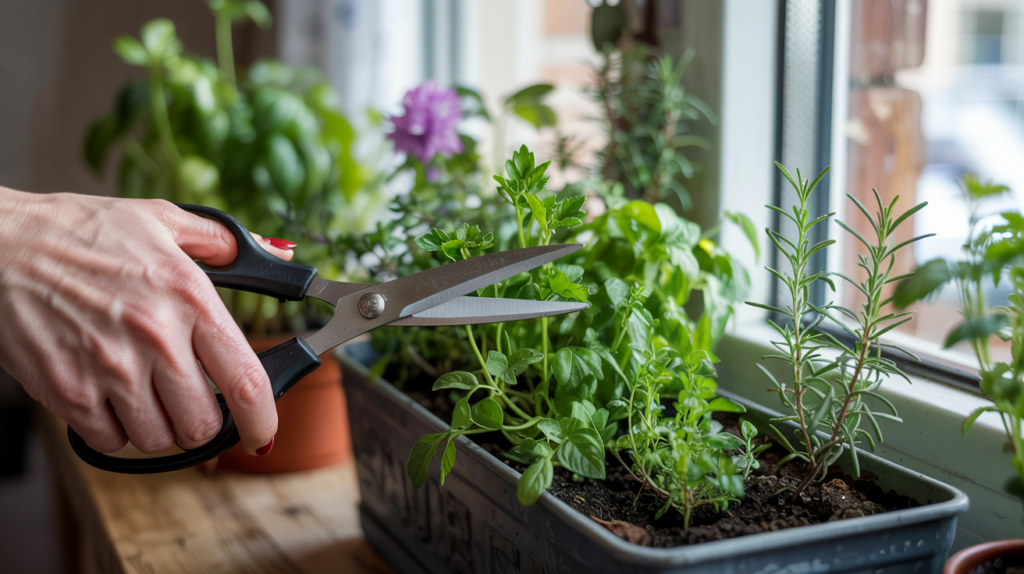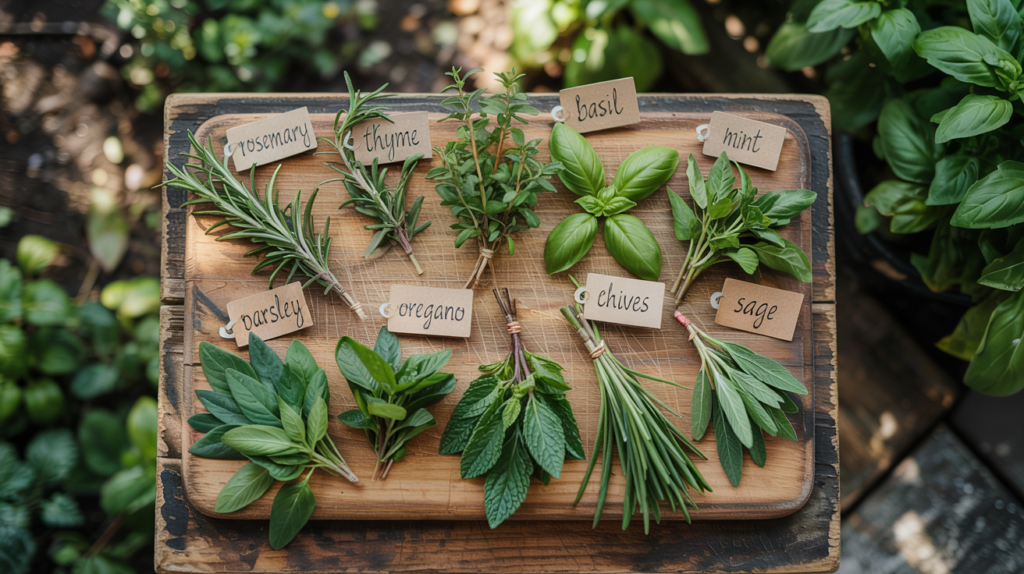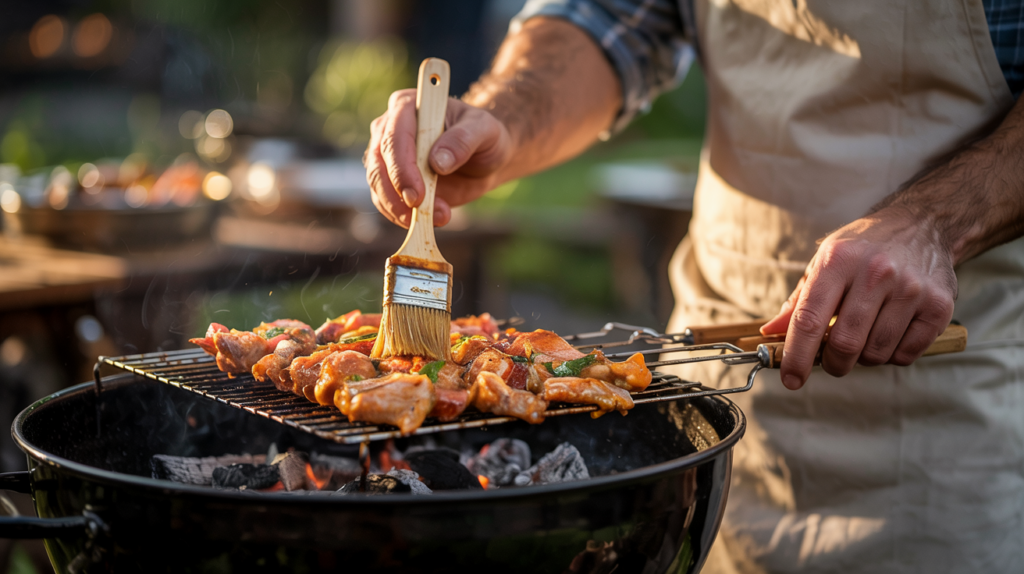
Growing your own herbs for BBQ marinades and punchy salad dressings will bring flavour and colour by the bucketload to your culinary offerings. Dried or shop-bought fresh just aren’t a patch on growing your own. They’re also a really good way of getting into gardening if you’re new to the game or have kids who want a garden project. And this is before we even start on the cost. If you’ve ever tried to make your own pesto using supermarket basil, you’ll know exactly what we’re talking about.
In this quick guide, we’ll take you on a heavenly-scented journey—from planting the right herbs for your soil and sunshine levels, to conjuring up some delicious marinades that will definitely up your BBQ game. Whether you’re a seasoned gardener or a BBQ enthusiast looking to experiment, this guide will help you make the most of your outdoor space and your grill.
Don’t forget to pick up a quality BillyOh barbecue from our range.

Why Grow Your Own Herbs for BBQ?
If you’ve ever compared fresh herbs to their dried counterparts, you’ll know the difference is undeniable. Don’t get us wrong—we’re not writing off dried herbs; they absolutely have their place in the kitchen. But, as with most things in life, it’s about using the right tool for the job.
Here’s why homegrown herbs are a game-changer for BBQ marinades:
- Freshness and Intensity – Fresh herbs provide a more potent and aromatic flavour. They’re a glorious sledgehammer to the senses—both in the garden and on your plate.
- Cost-Effectiveness – One single herb plant can give you multiple harvests, saving you a decent amount of money in a surprisingly short time. Don’t be fooled into thinking the supermarket pots will cut it though—they never grow at the rate you want! Head to a garden centre for seedlings, or propagate from seed on a sunny windowsill.
- Sustainability – Growing your own means fewer plastic-wrapped herbs from the supermarket and a lower carbon footprint—not to mention fewer human hours involved in production and transport.
- Customisation – Tailor your marinades with funky or mellow blends to suit your taste and menu. Having fresh herbs on hand gives you the freedom to experiment, rather than being limited by supermarket availability or prices. Ever tried to find fresh oregano in the UK? Not the easiest.
- Health – The health benefits of fresh fruit and vegetables are well known, and herbs are no different. When you cut a plant and eat it straight away, the nutrient content is far higher. By contrast, supermarket herbs might have been in cold storage for days or even weeks. Time reduces the bioavailability of vitamins and minerals—so while you might think you’re buying something healthy… hmmm.

Top Herbs to Grow for BBQ Marinades
Some herbs thrive better than others in UK gardens, and some pair particularly well with grilled foods. Let’s have a look at what we can get away with in our climate, and how that could work on your BBQ:
1. Rosemary
- Flavour Profile: Earthy, woody, and slightly peppery. A classic and much-loved UK herb thanks to its hardiness.
- Best For: Lamb, chicken, beef, and potatoes. Also great in a sauce vierge or similar ‘suits all’ sauce.
- Growing Tips: Rosemary prefers well-drained soil and plenty of sunlight. As long as you’re not planting it in clay-heavy soil in deep shade, you should be fine. It’s drought-resistant and thrives in pots—perfect if you’ve got a veranda or balcony.
2. Thyme
- Flavour Profile: Woody and slightly floral. Another UK favourite. It’s got a hint of citrus but is very delicate.
- Best For: Chicken, pork, and grilled vegetables.
- Growing Tips: This plant loves sun—dry, well-drained soil is a must. You could grow thyme and rosemary side by side—they have similar needs, although rosemary is slightly more forgiving. Trim it regularly to stop it getting too leggy.
3. Basil
- Flavour Profile: Sweet, citric. How to describe basil without saying basil? Fragrant, strong yet delicate at the same time.
- Best For: Fish, chicken, and Mediterranean-style marinades or dressings. Excellent if you need a bit more zing for your vegetarian guests to lift their grilled veggies.
- Growing Tips: Needs warmth and moisture. Basil doesn’t like cold weather. If you’ve got a greenhouse or a sheltered spot, that’s ideal. Or grow it in pots you can move indoors when things get a bit too chilly outside.
4. Mint
- Flavour Profile: Cool, refreshing, slightly sweet. This spans a lot of cuisines—of course, we love it in the UK with lamb, but Greece uses it widely too.
- Best For: Lamb, fish, and fruit-based marinades.
- Growing Tips: Mint spreads aggressively, so you’ll want to keep it contained! Even if you’ve got plenty of space, we’d still recommend a boxed bed or something similar. If you’re working with a balcony, a long window box is ideal. You’ll be well stocked for marinades (or mojitos!) without risking a full-blown mint invasion.
5. Parsley
- Flavour Profile: Fresh, slightly peppery with a mild bitterness. Useful for when you’ve got coriander haters—as they’re in the same plant family but parsley doesn’t have that ‘soapy’ reaction. Parsley is excellent for digestion too—so even if you just want to chew a small sprig after a particularly filling meal, your body will thank you. Also, if you’re planning a BBQ with a hint of South America, parsley is your friend! Here are some thoughts on Chimichurri.
- Best For: Chicken, fish, and general-purpose marinades.
- Growing Tips: Grows well in most soils but does prefer a sunny or partially shaded spot.
6. Oregano
- Flavour Profile: Bold, slightly bitter, and highly aromatic. Much loved in Italian and Greek dishes. It’s one of the lesser-used fresh herbs in the UK, but once you give it a go, you’ll really start to recognise—and crave—it.
- Best For: Pork, beef, and tomato-based marinades. It works best with dishes that can handle a healthy dose of flavour.
- Growing Tips: This is a hardy perennial that thrives in well-drained soil. It does need full sun though, being a Mediterranean native.
7. Chives
- Flavour Profile: Onion-garlic flavour, although a lot milder.
- Best For: Fish, poultry, and vegetable marinades. Also great in salads or as a garnish to glam up a potato salad (for example).
- Growing Tips: Really easy to grow in both pots and smaller garden beds. It needs regular watering due to its delicate nature; it’s not quite as hardy as some of the others.
8. Sage
- Flavour Profile: Earthy, slightly peppery, with a musky aroma. Sage can be a bit divisive, but we think that’s mainly down to people using it badly. It’s excellent in the right hands.
- Best For: Pork, duck, and rich meat marinades. Despite being earthy, it brings a certain lightness to richer sauces and marinades. Also—a little fancy chef tip… hard-fry a few leaves and use them as garnish. Delightful little hit of flavour and texture.
- Growing Tips: Prefers well-drained soil and lots of sunlight. Are you sensing a theme here?

Getting Started with Your Herb Garden
Even if you’re new to the game, growing herbs can be straightforward with the right approach and a bit of patience:
- Choose a Location: Most herbs thrive in sunny spots that get at least six hours of direct sunlight.
- Soil & Drainage: Use well-draining soil. Adding compost helps boost fertility, which gives your herbs a strong start.
- Watering Routine: While regular watering is important, don’t overdo it—soggy roots will rot. Keep the soil damp, not drenched.
- Harvesting: Pick herbs in the morning for peak flavour, and trim frequently to encourage new growth. If you end up with a glut—what a lovely problem to have! Infused oils are a good starting point. We like blending up our favourite marinades and freezing them in ice cube trays. You can drop them into all sorts of dishes.
Got a sauce that’s a bit flat? Chuck one in. Something bubbling away in the slow cooker? Same again. It doesn’t take much effort to stay well-stocked and keep those taste buds tingling.

The Art of Herb-Infused Marinades
A good marinade rests on three key components:
- Acid – Lemon juice, vinegar, yoghurt… anything with a bit of sharpness to tenderise the meat.
- Oil – Olive oil, sesame oil, etc. These help carry the flavours and keep everything juicy.
- Flavour Enhancers – Fresh herbs, garlic, spices, a touch of sugar or honey, salt and pepper.
Fresh vs. Dried Herbs
Fresh herbs bring a livelier, more aromatic flavour to the party, while dried herbs tend to be stronger and more concentrated. Both have their place—sometimes you want subtle, sometimes you want punchy. If you’re swapping one for the other, the general rule is three parts fresh to one part dried.
Herb-Infused Marinade Recipes
Here are a few of our go-tos—simple, flavour-packed, and ridiculously easy to throw together.
- Rosemary-Garlic Marinade (Lamb or Beef)
Rich, earthy, and a proper classic.
- 3 tbsp olive oil
- 2 tbsp fresh rosemary (chopped)
- 3 garlic cloves (minced)
- Juice of 1 lemon
- Salt & pepper to taste
- Lemon-Thyme Marinade (Perfect for Chicken)
This one’s zingy with a floral twist.
- 4 tbsp olive oil
- 2 tbsp fresh thyme (chopped)
- Zest and juice of 1 lemon
- 1 garlic clove (minced)
- 1 tsp honey
- Coriander-Lime Marinade (Ideal for Fish)
Bright, citrussy, and perfect on white fish.
- 3 tbsp olive oil
- 2 tbsp fresh coriander (chopped)
- Juice of 2 limes
- 1 tsp ground cumin
- 1 garlic clove (minced)
- Mint-Yoghurt Marinade (Lamb or Grilled Veg)
Cool and creamy with a subtle herb hit—brilliant for balancing spice.
- 4 tbsp Greek yoghurt
- 2 tbsp fresh mint (chopped)
- Juice of ½ lemon
- 1 tsp ground coriander

Tips for Grilling with Marinades
- Let It Soak In: For big flavour, give it time. A few hours at least—overnight if you can manage it. Rotate the meat now and again if you remember.
- Watch the Flames: Before grilling, pat things dry to avoid flare-ups. Oil dripping onto hot coals can turn dinner into a fire show.
- Brush It On: Keep a little marinade aside (untouched by raw meat!) and brush it on during grilling to build layers of flavour.
FAQ
Q: Any herbs I should avoid in long marinades?
A: Yes—delicate ones like dill or tarragon. They break down quickly and can end up looking sad. Keep them for finishing touches instead.
Q: How long should I marinate meat or veg?
A:
- Chicken: 2–6 hours
- Beef: 4–24 hours
- Fish: 15–30 minutes
- Veg: 30–60 minutes
If you’ve only got an hour, that’s fine too—better than nothing. The herbs will still do their thing.
Q: Can I freeze fresh herbs for later use?
A: Definitely. Chop them up, pop them in an ice cube tray with olive oil, and freeze. Perfect for instant flavour bombs when you’re in a rush. If you’ve got a stick blender, even better.
Now then, fingers crossed for decent weather this summer. Let’s make the most of our gardens, our herbs, and the chance to share good food with good people.
Enjoy your garden-to-grill adventure.

